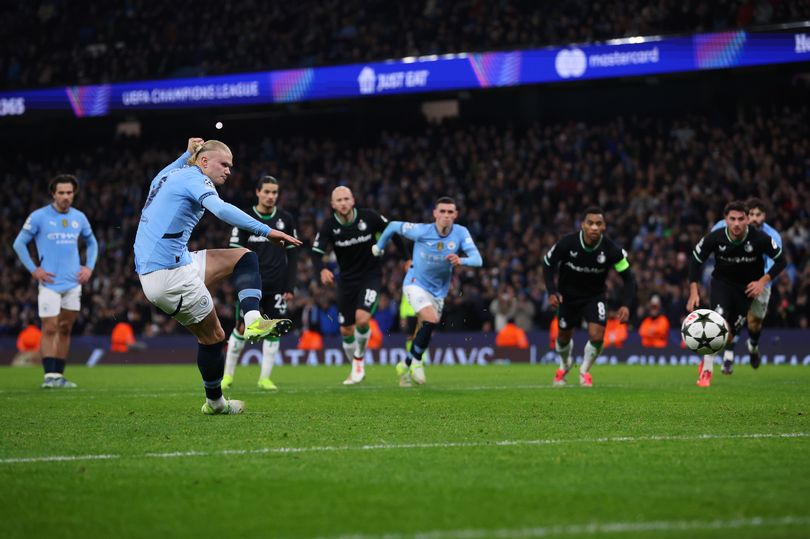
Manchester City finally returned to winning ways against Feyenoord, thanks largely to an Erling Haaland brace, a performance that came just a day after Pep Guardiola publicly defended his star striker. The victory marked a crucial turning point for the club as they looked to break free from an uncharacteristic losing streak, which had sparked widespread discussions among fans and pundits about what exactly had gone wrong for the defending champions.
The Pressure of a Losing Streak
When a team as dominant as Manchester City experiences an unexpected dip in form, the scrutiny is intense. The recent losing streak—the longest in Guardiola’s tenure at the club—has led to countless theories and debates, with no stone left unturned in the quest to find a definitive answer. Was it injuries? A tactical imbalance? Over-reliance on certain players? Or perhaps a combination of all these factors? The reality, as always, is more nuanced. Injuries have certainly played a role, but the issues run deeper, extending beyond the confines of the medical room.
One of the more persistent theories involves Erling Haaland. Critics argue that City’s attacking potency has become too dependent on their Norwegian talisman. The statistics partially support this view: when Haaland doesn’t score, City’s offense often struggles to find alternative solutions. This narrative gained traction after Haaland missed two critical chances against Tottenham, moments that underscored his recent struggles. Despite being one of the most prolific strikers in the world, Haaland has been underperforming his expected goals (xG) in recent matches, a trend that has coincided with City’s slump.
Guardiola’s Defense of Haaland
Pep Guardiola, however, has been quick to dismiss the notion that City’s reliance on Haaland is a weakness. In his characteristic style, Guardiola addressed the media’s concerns with a blend of humor and defiance. “Tell me one team where Erling plays that would not depend on him,” he retorted. “Without Erling, we would be in more trouble. We are lucky that we have Erling, and every game he has three or four chances. That is what I want from my team.”
Guardiola’s faith in Haaland was evident in his pre-match instructions. He urged his players to “follow me” and trust in the processes that have made them four-time Premier League champions. This message was clear as City took to the pitch against Feyenoord with a renewed sense of purpose. They started the match brightly, mirroring their energetic opening against Tottenham. However, as the game settled into a more subdued rhythm, City’s resilience and adherence to their manager’s philosophy became evident.
A Crucial Penalty and Mind Games
The breakthrough came when Haaland was brought down in the box, earning City a somewhat fortuitous penalty. The ensuing drama encapsulated the psychological warfare that often accompanies such high-stakes moments. As VAR reviewed the incident and Feyenoord players protested, Haaland remained composed, stepping away from the commotion. Meanwhile, Jack Grealish took it upon himself to guard the penalty spot, ensuring that no Feyenoord players could disrupt the turf—a subtle but significant act of gamesmanship.
The tension escalated as Feyenoord’s goalkeeper, Timon Wellenreuther, employed every trick in the book to delay the penalty. From wiping his forehead to adjusting his boots, he sought to unnerve Haaland. The striker, however, responded with mind games of his own. Only when Wellenreuther was finally ready did Haaland place the ball on the spot, take a moment to compose himself, and then coolly fire the ball down the middle. The celebration that followed was a mix of relief and defiance. Haaland’s teammates rushed to embrace him, recognizing the psychological weight he had been carrying.
Team Support and Confidence Building
This goal was more than just a point on the scoreboard; it was a pivotal moment for Haaland and the entire squad. Even for a record-breaking striker, confidence can be fragile, and the support of his teammates was crucial. They didn’t just help him score—they made sure he knew they had his back. This collective spirit could prove instrumental as City navigate the challenges ahead.
The second goal, which came after Matheus Nunes raced clear and set up Haaland, was vintage Haaland. Sprinting into position and sliding in to finish, he showcased the instinctive brilliance that has defined his career. This was the Haaland that City fans know and love, and it was a reminder of Guardiola’s assertion that it was only a matter of time before the goals started flowing again.
Defensive Concerns and Looking Ahead to Liverpool
While Haaland’s brace provided a much-needed boost, the defensive frailties that have plagued City’s recent performances were still evident. At full-time, Haaland’s frustration was palpable, a reminder that the team’s problems extend beyond their attacking output. If City are to turn their season around, particularly in their upcoming clash against Liverpool at Anfield, they will need more than just Haaland’s heroics. Defensive solidity and collective resilience will be key.
Conclusion: A Turning Point?
Manchester City’s victory over Feyenoord was significant, not just for the three points, but for the psychological lift it provided. Haaland’s performance, backed by Guardiola’s unwavering support and the solidarity of his teammates, could mark the beginning of a turnaround. However, the journey ahead is fraught with challenges, and the true test will come in the high-pressure environment of Anfield.
For now, City can take solace in the fact that their star striker is back among the goals. With Guardiola at the helm and Haaland leading the charge, the champions still have the tools to reclaim their dominance. The question is whether they can address the deeper issues that have surfaced during this turbulent period.
Leave a Reply